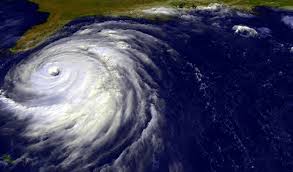Hurricane preparedness is a two-pronged operation: steps to take before hurricane season begins and steps to take when a hurricane is actually approaching.
Before the onset of hurricane season:
• Develop an evacuation plan. Be familiar with routes to higher ground. Determine where you will go and your route to the destination.
• Develop a family communication plan. Identify an out-of-area contact to notify if evacuation is necessary.
• Assemble emergency supplies: water (one gallon per person for three days), food (three day family supply of non-perishables), flashlight with extra batteries, radio with extra batteries, cell phone with chargers, inverter or solar charger, basic first aid kit, manual can opener, pliers, personal sanitation supplies (pre-moistened wipes, tissues, plastic trash bags), plastic sheeting or tarps and duct tape to shelter in-place.
• Evaluate your property – Determine the elevation and whether the land is flood-prone. Identify levees and dams in your area to determine if they pose a threat. Forecast your property’s vulnerability to tidal flooding or storm surge and make preventive adjustments.

• Clear clogged rain gutters and downspouts to avoid back-ups and trim down trees and shrubs around your home to increase their wind resistance.
• Consider how and where to secure your RV, boat or other vulnerable vehicles and equipment.
• Install an emergency generator.
• To reduce roof damage use strapping or clips to further secure the roof to the structure’s frame.
• Consider building a storm bunker or safe room.
When you are under hurricane watch or warning and a storm is approaching :
• Charge computers, cell phones, rechargeable batteries and other essential electronics.
• Be sure your automobile is fueled. If you have a generator, make sure you have fuel on-hand.
• Secure all doors and windows, ideally with storm shutters. Exterior or marine grade 5/8” plywood, properly secured, can be effective. Reinforce garage doors, as well.
• Bring in outdoor furniture, decorations, bikes, grills and garbage bins. Pick up downed branches, toys and other loose items.
• Close and secure gates and chimney flues.
• Fill bathtubs for extra water.
• Turn down the temperature on your refrigerator and freezer in anticipation of power loss. This will help to keep food longer without power.
• Turn down the temperature of your air conditioner to help keep you comfortable longer in the event of a power loss.
• Round up pets to safe quarters.
Not all hurricane damage can be anticipated or prevented. Insurance policies are the best way to financially protect yourself from serious property damage. If you suffer an insured loss consider enlisting a public adjuster like BenchMark to navigate for you the difficult and stressful claim and settlement process. A public adjuster works only for the policyholder to achieve the most equitable settlement possible.